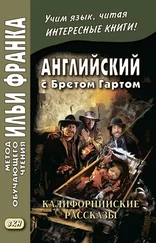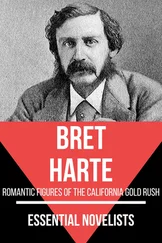Bret Harte - Tennessee's Partner
Здесь есть возможность читать онлайн «Bret Harte - Tennessee's Partner» — ознакомительный отрывок электронной книги совершенно бесплатно, а после прочтения отрывка купить полную версию. В некоторых случаях можно слушать аудио, скачать через торрент в формате fb2 и присутствует краткое содержание. Издательство: Иностранный паблик, Жанр: foreign_sf, literature_19, foreign_antique, foreign_prose, на английском языке. Описание произведения, (предисловие) а так же отзывы посетителей доступны на портале библиотеки ЛибКат.
- Название:Tennessee's Partner
- Автор:
- Издательство:Иностранный паблик
- Жанр:
- Год:неизвестен
- ISBN:нет данных
- Рейтинг книги:5 / 5. Голосов: 1
-
Избранное:Добавить в избранное
- Отзывы:
-
Ваша оценка:
- 100
- 1
- 2
- 3
- 4
- 5
Tennessee's Partner: краткое содержание, описание и аннотация
Предлагаем к чтению аннотацию, описание, краткое содержание или предисловие (зависит от того, что написал сам автор книги «Tennessee's Partner»). Если вы не нашли необходимую информацию о книге — напишите в комментариях, мы постараемся отыскать её.
Tennessee's Partner — читать онлайн ознакомительный отрывок
Ниже представлен текст книги, разбитый по страницам. Система сохранения места последней прочитанной страницы, позволяет с удобством читать онлайн бесплатно книгу «Tennessee's Partner», без необходимости каждый раз заново искать на чём Вы остановились. Поставьте закладку, и сможете в любой момент перейти на страницу, на которой закончили чтение.
Интервал:
Закладка:
Bret Harte
Tennessee's Partner
The Introduction
When Marshall's discovery caused a sudden influx of thousands of adventurers from all classes and almost all countries, the conditions of government in California were almost the worst possible. Though the Mexican system was unpopular and the Mexican law practically unknown, until other provision was made by congress, they had to continue in force. But the free and slave states were equal in number; California would turn the scale; there was a battle royal as to which pan should descend, a battle that the congresses of 1848 and 1849 left unsettled on adjourning.
Under these circumstances, it might be supposed that the worst elements would get the upper hand, crime become common, and anarchy result. Precisely the opposite happened. The de facto government was accepted as a necessity, and under its direction "alcaldes" and "ayuntamientos" were elected. But the mining-camps, which were in a part of the country that had not been settled by the Mexicans and were occupied by men who knew nothing of their system or laws, were left to work out their own salvation. The preponderating element was the Anglo-Saxon, and its genius for law and order asserted itself. Each camp elected its own officers, recognized the customary laws and adopted special ones, and punished lawbreakers. Naturally theft was considered a more serious crime than it is in ordinary communities. As there were no jails or jailors, flogging and expulsion were the usual punishment, but in aggravated cases it was death. Even after the state government had been organized, indeed, the law for a short while permitted a jury to prescribe the death penalty for grand larceny, and, in fact, several notorious thieves were legally executed.
The testimony of all observers is that the camps were surprisingly orderly, that crime was infrequent, and that its punishment, though swift and certain, leaned to mercy rather than rigor. Bayard Taylor, for example, who was in the mines in '50 and '51, writes: "In a region five hundred miles long, inhabited by a hundred thousand people, who had neither locks, bolts, regular laws of government, military or civil protection, there was as much security to life and property as in any state of the Union."
As these "miners' courts" were allowed after the organization of the state to retain jurisdiction in all questions that concerned the appropriation of claims, the miners but slowly appreciated that they had been shorn of their criminal jurisdiction. But that they did come to recognize that "the old order changeth, yielding place to new," is, in fact, shown by the very incident on which Harte based his of a lynching.
Spite of the autobiographic method that leads the casual reader to think that Harte was intimately connected with this early pioneer life and derived the material for his sketches from personal observation and experience, his is, in truth, only hearsay evidence. The heroic age was with Iram and all his rose ere he landed in 1854, a lad of eighteen. With no especial equipment for battling with the world, he had to turn his hand to many things, and naturally tried mining. But finding the returns incommensurate with the labor, he soon gave it up and sought more congenial occupations, mainly in the towns of the valleys and the seacoast. Before he was twenty-three, he had been school-teacher, express-messenger, deputy tax-collector, and druggist's assistant; and had risen from "printer's devil" to assistant editor of a country newspaper. In 1859 he was back in San Francisco, utilizing the trade he had picked up, as a compositor on The Golden Era. To this he contributed poems and local sketches that soon led to his appointment as assistant editor. His writings made him friends, one of whom, Thomas Starr King, in 1864, obtained for him the position of secretary to the superintendent of the Mint. His duties were not arduous, and his rooms became the resort of his literary associates and of men from "the diggings," whose mines, like the meadows of Concord, yielded a two-fold crop: gold-dust for the superintendent to turn into bullion, and stories for his young secretary later to turn into literature. By 1868 his reputation was so great that when Mr. A. Roman established The Overland Monthly, he was made its first editor.
Mr. Roman impressed upon him the literary possibilities of the life of the miners, and furnished him with incidents, tales, and pictures. "The Luck of Roaring Camp," his first venture in this hitherto almost untouched field, proved that Bret Harte had come into his own. His local sketches and Mexican legends had been imitative of Irving, his stories of Dickens; but for this he had evolved a method and a style distinctly personal. His first success was followed up by "The Outcasts of Poker Flat" and (in October, 1869) by the tale here reprinted; and when, in 1870, an Eastern house published his sketches in book form, his fame was secure. In 1871 he left California, and after a few years in the East that added little to his reputation as a writer, or as a man, secured a consulate in Germany. In 1878 he left America forever. Till his death in 1902 he wrote on, frequently recurring to the claim where he first "got the color," but never equaling his work during the year and a half that he was editor of the Overland.
In 1866 Harte heard, from one who had been present, the incident that inspired "Tennessee's Partner." Eleven years before, at Second Garrote, a newcomer had committed a capital crime. The miners organized a court, appointed counsel, and gave the miscreant a trial. He confessed his guilt, and the cry arose, "Hang him!"' But "Old Man Chaffee" stepped forward, drew a bag of gold-dust from his bosom, and said that he would give his "pile" rather than have a lynching occur in a camp that, spite its name, had never been so disgraced. He begged the crowd to turn the prisoner over to the authorities and let the law take its course. Such was the fervor of his appeal and so great were the respect and affection for the old man that his proposal was adopted with a cheer for the advocate of law and order, and the culprit taken to the jail at Columbia.
Chaffee's partner, Chamberlain, seems to have had no part in this affair; but the two were united by a love like that of his partner for Tennessee. And long after the Second Garrote had become but a memory, the two octogenarians lived on in their little cabin, Chaffee seeking with primitive pick, shovel, and pan the more and more elusive gold, and Chamberlain contributing to the common purse by cultivating a small "ranch," the best crop of which was the campers who came to chat of bygone days with "the original of Tennessee's Partner." At last, in 1903, their partnership of fifty-four years was ended by the death of Chaffee. Within eight weeks he was followed by Chamberlain. Their last days were made easy by the bounty of Professor W. E. Magee, of the State University, to whom I am indebted for the authority for some of these statements,—Chamberlain's journal.
Конец ознакомительного фрагмента.
Текст предоставлен ООО «ЛитРес».
Прочитайте эту книгу целиком, на ЛитРес.
Безопасно оплатить книгу можно банковской картой Visa, MasterCard, Maestro, со счета мобильного телефона, с платежного терминала, в салоне МТС или Связной, через PayPal, WebMoney, Яндекс.Деньги, QIWI Кошелек, бонусными картами или другим удобным Вам способом.
Интервал:
Закладка:
Похожие книги на «Tennessee's Partner»
Представляем Вашему вниманию похожие книги на «Tennessee's Partner» списком для выбора. Мы отобрали схожую по названию и смыслу литературу в надежде предоставить читателям больше вариантов отыскать новые, интересные, ещё непрочитанные произведения.
Обсуждение, отзывы о книге «Tennessee's Partner» и просто собственные мнения читателей. Оставьте ваши комментарии, напишите, что Вы думаете о произведении, его смысле или главных героях. Укажите что конкретно понравилось, а что нет, и почему Вы так считаете.












